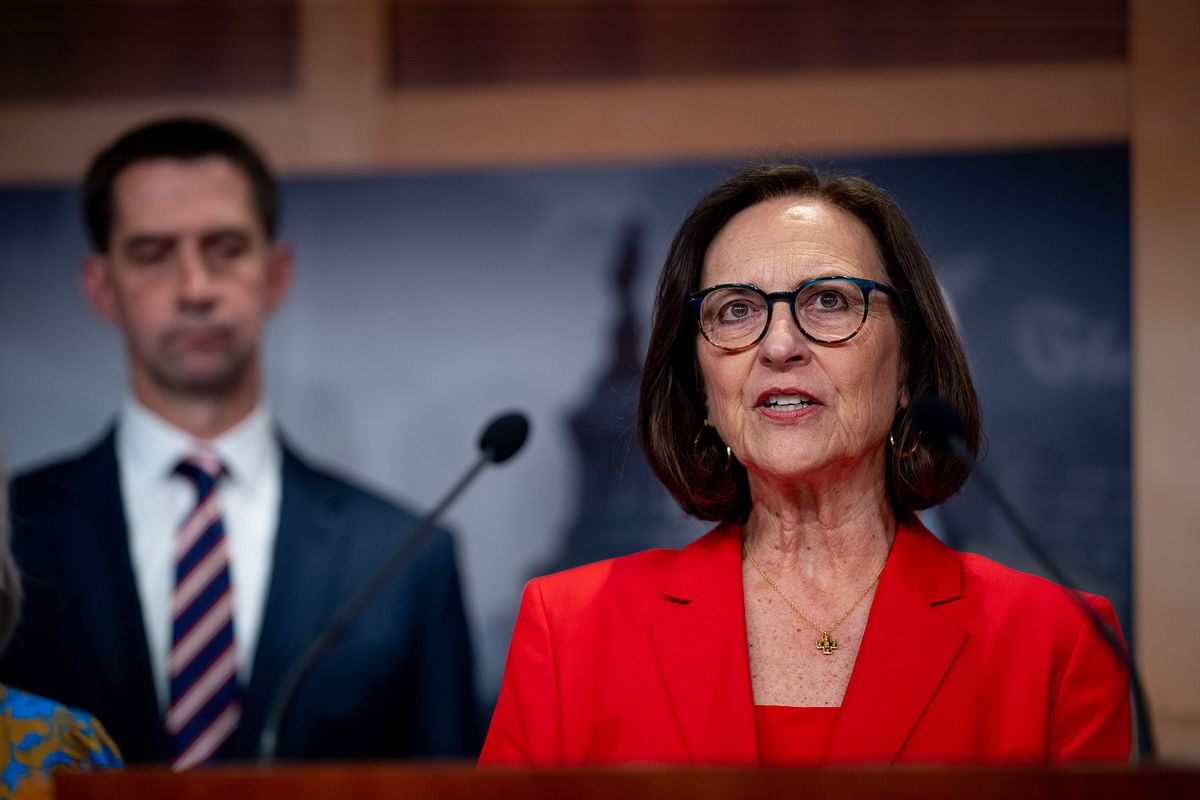Union steamfitter Dan Osborn is running against incumbent Republican Sen. Deb Fischer in Nebraska, one of the country's reddest states — and there are signs that the race could be much closer than expected. Osborn is an independent, not a Democrat, and insists he's not aligned with either major political party. But the narrow focus of his platform suggests a possible model for taking on Republicans in states where the Democratic brand is particularly weak.
The U.S. Senate race in the Cornhusker State suddenly registered on the national radar after a recent Split Ticket and Survey USA poll that found Osborn trailing Fischer by just one point, 39 to 38 percent.
Republicans have publicly dismissed the poll, and many political analysts have been skeptical — perhaps with reason — that an independent candidate could actually win in Nebraska, the Osborn campaign says internal polls have reported similar results.
The Survey USA poll also suggested that undecided voters, who accounted for about 20% of survey respondents, may be friendlier to Osborn than to Fischer. In the poll's crosstabs, 20% of those undecided voters supported President Biden in 2020, while only 10% supported former President Donald Trump.
Osborn also runs close to Fischer among the state's heavily conservative rural voters, trailing her by 40 to 36 percent with Democrat Preston Love far behind at 22 percent. Furthermore, 17% of 2020 Trump voters in Nebraska say they plan to support Osborn in this election, while just 7% of 2020 Biden voters plan to support Fischer.
Osborn has refused to toe either party’s line, though he has certainly adopted popular positions on two issues that Nebraskans will weigh in on this November: cannabis and abortion.
When it comes to campaign funding, however, Osborn is in a more difficult spot. He has raised just $1.6 million this year and has only about $600,000 left in cash on hand. (As an independent, he's getting no support from a national party organization.) Fischer has raised more $6.2 million and has about $2.4 million left, according to the most recent Federal Elections Commission filings.
On the issues, Osborn has refused to toe either party’s line, though he has certainly adopted popular positions on two issues that Nebraskans will weigh in on this November: cannabis and abortion.
He has said he would vote to codify the constitutional protections formerly afforded by Roe v. Wade, a position that has plurality support of 45 percent in Nebraska, according to Survey USA poll. He also supports the federal legalization of medical cannabis, a position with 71 percent support in Nebraska, and supports removing cannabis from Schedule I, the federal government's most restrictive category. Both of those issues will come before Nebraska voters as ballot initiatives.
Beyond those hot-button issues, Osborn has maintained a highly disciplined campaign message with a relatively narrow focus. He has refused to take a position on the war on Gaza, for example, saying he did not want the issue associated with his campaign, according to the New York Times. Osborn’s campaign also declined to offer any comment for this story.
We need your help to stay independent
He has, however, discussed his positions on economic topics, striking notably pro-labor positions and indicating that he would likely vote for the PRO Act, which would expand legal protections related to union organizing efforts, or for similar legislation. Some Senate Democrats, including Sen. Mark Kelly of Arizona and Sen. Mark Warner of Virginia, have declined to support the PRO Act.
Osborn has been endorsed by Nebraska's Teamsters locals and the United Auto Workers, as well as by other unions, and has laid the blame for recent inflation on corporate price-gouging rather than government policy. He’s also staked out populist positions on topics like "right to repair" — a major issue in a farm state — and railroad safety, two issues that typically don't have much resonance in U.S. Senate campaigns.
One area where Osborn is clearly seeking to distinguish himself from Democrats is on border policy, widely perceived as a Republican strength. While Osborn told Politico that he would be unlikely to join Republicans in seeking to impeach Homeland Security Secretary Alejandro Mayorkas, he has positioned himself as relatively hawkish on immigration, indicating that he would find a way to “bring together a majority” to pass border security legislation in the Senate, and would support closing the border until new legislation is passed. (Which would likely be both illegal and impossible.)
Want a daily wrap-up of all the news and commentary Salon has to offer? Subscribe to our morning newsletter, Crash Course.
Osborn has also tried to find a difficult middle ground on gun control and gun rights, saying that he would vote to expand universal background checks for firearms sales but would oppose an assault weapon ban.
In another effort to separate himself from mainstream Democrats, Osborn told Politico that he would have voted against the 2021 bipartisan infrastructure bill because it was likely to increase the national debt, an apparent gesture to fiscal conservatism. Fischer, the incumbent, was among a handful of Republicans to support that bill, which had major benefits for rural states like Nebraska.
In historical terms, Osborn still faces long odds in his effort to win in November. (There are currently three independents in the Senate, all of whom caucus with Democrats: Sen. Angus King of Maine, Sen. Bernie Sanders of Vermont and Sen. Kyrsten Sinema of Arizona.) According to the polls, Osborn is well ahead of where independent candidate Evan McMullin was in his 2022 challenge to Sen. Mike Lee, R-Utah, and about even with independent Al Gross was in his 2020 campaign against Sen. Dan Sullivan, R-Alaska. Both Lee and Sullivan ultimately won by comfortable margins.
Read more
about the 2024 campaign



Shares